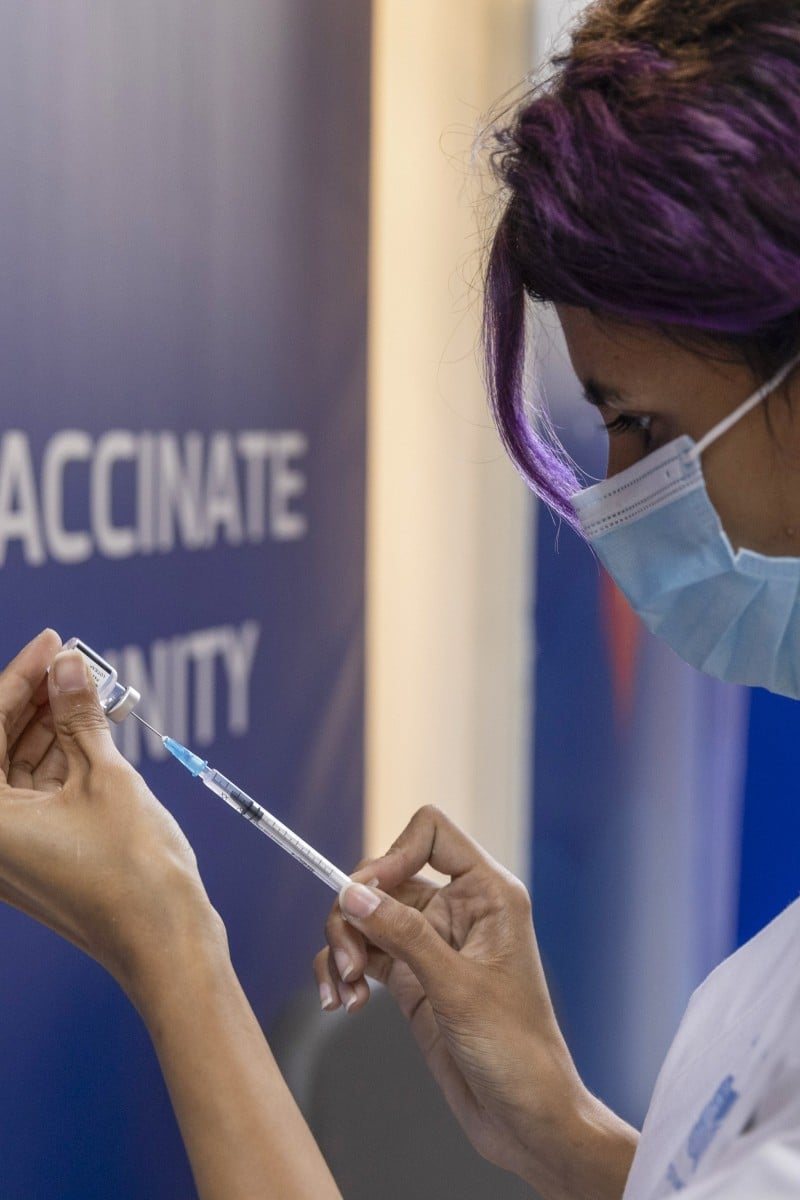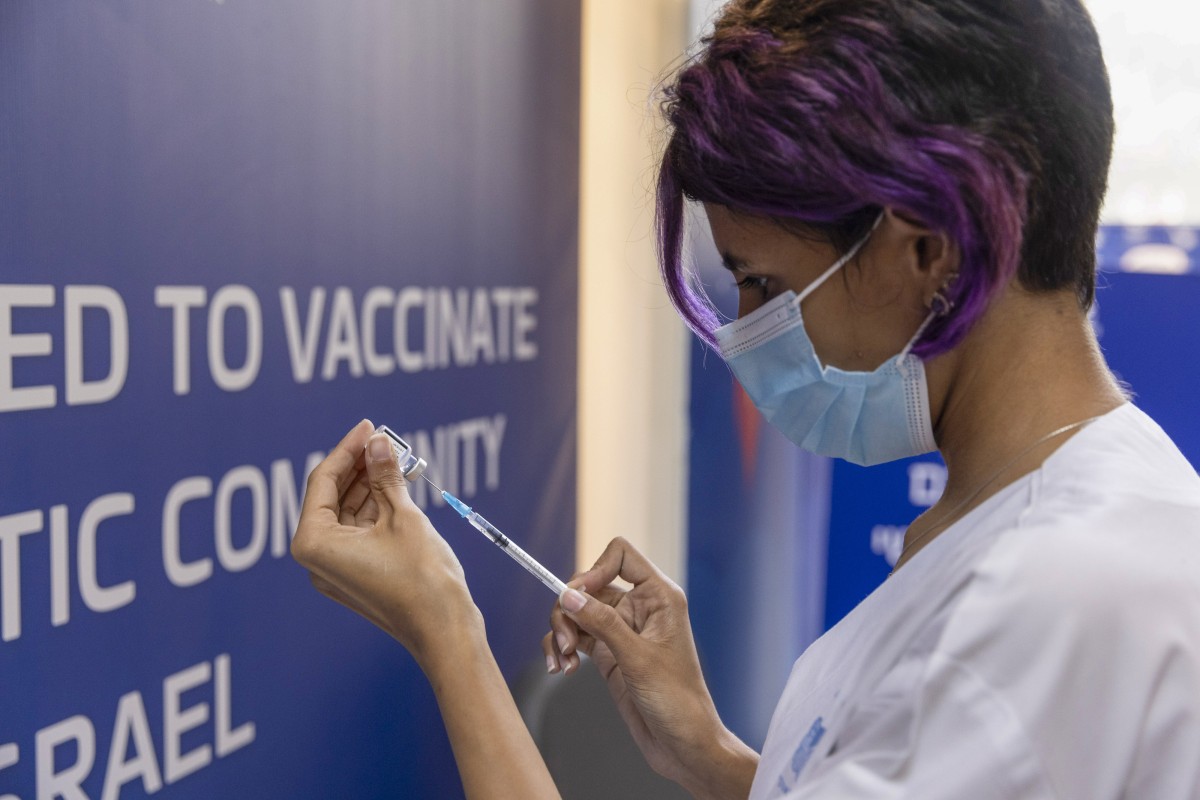
WHO says wealthy nations should forgo booster until Covid-19 vaccination improves worldwide
- The agency’s chief proposed a booster halt till all nations can vaccinate at least 10 per cent of their population.
- Wealthy countries argue it is beneficial to all to strengthen their own immunity while also seeking to aid others.
 A health worker prepares a booster dose of the Pfizer-BioNTech Covid-19 vaccine at Ichilov medical center in Tel Aviv, Israel. Photo: Bloomberg
A health worker prepares a booster dose of the Pfizer-BioNTech Covid-19 vaccine at Ichilov medical center in Tel Aviv, Israel. Photo: Bloomberg From its earliest days, the coronavirus pandemic has fallen most heavily on the poor, whether entire impoverished nations ravaged by Covid-19 or a lone individual gasping for breath.
In the latest emblem of the disease-driven divide between the wanting and the wealthy, the head of the World Health Organisation (WHO) on August 4 urged mainly well-off, highly vaccinated nations to hold off for now on offering booster shots until all countries – including predominantly poorer ones now ablaze with the virus – can provide more of their people with initial shots.
The call for a hiatus in booster shots marks yet another hinge moment in a worldwide contagion that has killed more than 4.25 million people, including nearly 615,000 in the United States. Adding impetus to the dispute, and human tinder to the coronavirus conflagration, is the rapidly spreading Delta variant, with experts warning that further viral evolution is waiting in the wings.
Coronavirus: Vaccinated Hongkongers infected with the Delta variant can still be highly contagious
WHO chief Tedros Adhanom Ghebreyesus, speaking at a briefing by the United Nations health agency, proposed a booster moratorium be observed at least through September, with a goal of making sure that all nations first achieve vaccination of at least 10 per cent of their population.
“We cannot, and we should not, accept countries that have already used most of the global supply of vaccines using even more of it while the world’s most vulnerable people remain unprotected,” Tedros said from Geneva.
Some public health experts said both ethical imperatives and cold scientific calculation support the call, arguing that the longer the virus remains in circulation, and the larger the pool of ready targets across the globe, the more time, money and deaths it will cost to finally end the pandemic.
The phenomenon of some countries moving toward booster shots while much of the world remains unvaccinated is at once “a moral outrage and a public health miscalculation,” said Jennifer Nuzzo, an epidemiologist with the Johns Hopkins Bloomberg School of Public Health. “No country will be safe from this continually mutating virus until all countries have gained access to vaccines.”
Others took issue with the WHO appeal, saying that the goal of easing vast vaccine disparity between rich and poor countries would not necessarily be advanced by more affluent ones abstaining from boosters for vulnerable groups or healthcare workers.
“I strongly disagree with the WHO’s call to restrict booster shots,” Leana Wen, of the Milken Institute School of Public Health at George Washington University, wrote on Twitter. “Yes, we need to get vaccines to the world (which also includes helping with distribution, not just supply), but there are doses expiring here in the US. Why not allow those immunosuppressed to receive them?”
Israel is now giving seniors a booster dose of vaccine to help control the recent uptick in cases. Photo: BloombergSome nations, including Germany, France and Israel, are moving to give booster shots to groups such as the elderly. Countries that have already achieved a measure of vaccine success argue it is beneficial to all for them to strengthen their own immunity while also seeking to aid others.
But nations where few people are vaccinated protest that layering on more protections for the affluent while leaving others unprotected is an injustice. Spurred by Delta, the virus is ravaging Africa, where the WHO says only 1.5 in every 100 people have had at least one shot. The number of known cases now tops 200 million worldwide.
The WHO’s proposed booster moratorium is nonbinding, but public health observers noted it is not the first time the agency has thrown its weight behind the notion that wealthy countries must take the lead in fighting the pandemic beyond their borders.
Coronavirus: Are three doses of the Covid-19 vaccine better than two? Debate over third shot
“The WHO services 194 sovereign entities, not just the most powerful ones,” said J. Stephen Morrison, the director of the Global Health Policy Centre at the Centre for Strategic and International Studies. “In that sense, Tedros is reflecting the desperation of his constituency – he’s reflecting back the anger, resentment and desperation they’re experiencing right now.”
The Biden administration has not taken a position on the need for booster shots but appeared to discourage any linkage between a moratorium and the fulfilment of worldwide vaccine aims.
“We definitely feel like it’s a false choice, and we can do both,” White House Press Secretary Jen Psaki said.
The US says it has provided more than 110 million vaccine doses to 65 countries. But the WHO said that of the more than 4 billion doses administered worldwide, more than four-fifths have gone to a tier of wealthier countries that are home to less than half the global population – and called that untenable.
Honduran Health Secretary workers unloading 1.5 million doses of Moderna vaccine donated by the US through the Covax scheme on June 27. Photo: Handout“We need an urgent reversal, from the majority of vaccines going to high-income countries, to the majority going to low-income countries,” Tedros said.
In making its case for sharing the vaccine wealth, the WHO seeks to emphasise that there is still some scientific debate over the need for boosters. But Pfizer, the pharmaceutical giant, is backing the use of booster shots, even though it says its existing two-shot regimen gives a high degree of protection against serious illness or death.
Experts said in countries able to provide third doses, momentum was building in favour of booster protocols.
The debate “highlights the privileged zone of the world” with enough vaccine supply to consider boosters, said analyst Morrison.
“Still, I don’t think it’ll be effective at stopping rich countries from pursuing it,” he said. “Every day, the list gets longer – there’s a proliferation of countries moving toward boosters.”
Anne Rimoin, a professor of epidemiology at the UCLA Fielding School of Public Health, said the twin goals of protecting Americans and vaccinating other parts of the world “aren’t mutually exclusive.” Like Wen, she pointed to the pressing need to ensure that less wealthy countries can distribute vaccine doses once they have them.
“We do need to consider what’s happening globally in order to protect ourselves locally,” she said. “We have to be fighting the war on both fronts.”